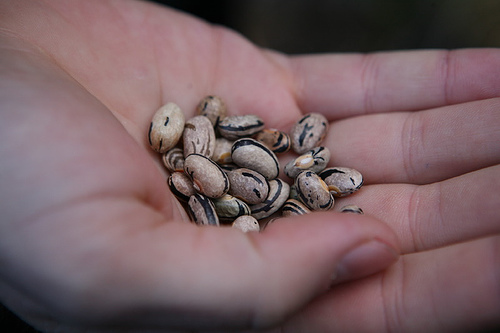EVENT: Seedy Saturday this weekend
You know spring can’t be far off when the annual Seedy Saturday Seed Share and Exchange hits Grand Forks.
This year the event, which is hosted by the Grand Forks and Boundary Regional Agricultural Society (GFBRAS) and the Boundary Organic Producers, runs from 10 a.m. to 2 p.m. Saturday, March 10 at the Holy Trinity Anglican Church, 7252 7th Street, Grand Forks.
“It’s a very informal event here in Grand Forks,” said Sheila Dobie, director for the Boundary Seed Bank Project.
“Our seed exchange emphasizes a hobnobbing and chatty atmosphere.”
The low-key social event will include booths for the Boundary Seed Bank Project, the Community Garden and the seed custodian program. Annemarie Berryman of Berryman’s Heirloom Gardens in Greenwood, will also have a booth featuring heirloom seeds and plants.
Berryman’s has been around for four years and Annemarie is especially known for her heirloom tomatoes.
If you don’t have seeds to exchange but would like some new seeds, just bring a small donation to support the project.
Seed custodians needed
If you feel strongly about supporting the Ag Society’s efforts in maintaining an active seed bank for the purpose of local food security, then you might consider becoming a seed custodian.
The Boundary Seed Bank Project began a few years ago with seeds donated by the Salt Spring Island Plant and Seed Sanctuary group www.seedsanctuary.com . Now the seed bank is building a base of seed donated by local sources.
A seed custodian needs to have an understanding or a desire to learn how to grow, save and harvest seeds, said Dobie.
Seeds cannot be cross pollinated, so depending on the seed chosen, there are guidelines about where it can be grown to keep the variety true. For example, said Dobie, onions, which only give seeds in the second season, need to be isolated one mile away from other onion varieties.
Seeds have a shelf life and therefore the seed bank supply needs to be continuely refreshed. The collection features hundreds of varieties of seeds in everything from heirloom tomato varieties to wheat and corn.
“We have a gazillion types of seeds but the volumes are small so we need to build that up,” said Dobie.
To get more volume and longevity to the seed collection, there needs to be a lot more participation …The food resiliance and the local food systems all make sense. Seed is where it all starts. We have peas and beans that have been in this valley for a long time.
The project booth will have information packages available and sign-up sheets for those who are interested. In the fall a seed cleaning workshop is held where the seed bank seeds are collected for storage.
Seedy Saturday movement began 23 years ago
The concept of Seedy Saturdays or seed exchanges began in Canada in the late 1980s. The first Seedy Saturday event was held in Vancouver on February 14, 1989. The movement was established to perserve heritage varieties of vegtables, fruits, flowers and grains that were nearly impossible to find at that time but are now more common thanks to the movement. Saving heritage seeds increases the genetic diversity of our foods and avoids the extinction of those varieites.
Seeds should be open-pollinated, which means they can germinate on their own. Today’s commerical seeds are often treated so they can’t reproduce and therefore forces the gardener to buy more seeds the following year.
For more information about Seedy Saturday please email the society at boundaryfarms@gmail.com or visit the website at www.gfbras.ca . Berryman’s Heirloom Gardens greenhouse will be open April 28. She will also be selling her heirloom vegetable plants and veggies at the local farmers market over the spring, summer and fall.






















